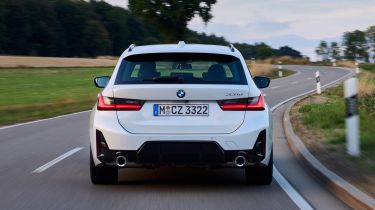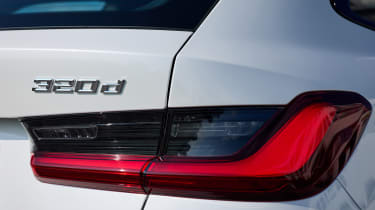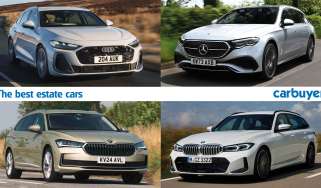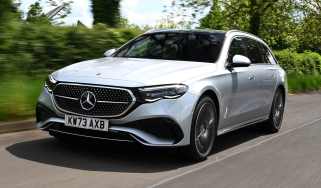BMW 3 Series Touring estate - MPG, running costs & CO2
Popular diesel models can return over 50mpg and the plug-in hybrid is even better
Customers are well catered for because the 3 Series Touring is available with petrol, diesel and plug-in hybrid powertrains to suit your lifestyle, preferences and budget. For those travelling shorter distances, or prioritising driving dynamics, petrols should fit the bill. High-mileage drivers are still likely to favour diesel but the 330e plug-in hybrid could also be a great option for them, particularly if they're company-car drivers thanks to its low BiK rating.
BMW 3 Series Touring MPG & CO2
The entry-level BMW 318d Touring and the best-selling 320d are the most efficient of the diesel line-up, managing up to 58.9mpg. Both are also affordable choices for private and business drivers alike, thanks to new mild-hybrid technology that gets CO2 emissions as low as 126g/km. Upgrading to four-wheel drive, a more lavish spec or the sportier 330d and M40d will, as you’d expect, impact fuel economy and make things more expensive for company car drivers.
The petrol 320i and 330i both use the same engine but with different power outputs, and have broadly similar economy figures; both should be able to achieve over 40mpg during normal driving, which should be fine for drivers that don’t regularly travel long distances.
A plug-in hybrid BMW 330e Touring is available for the first time in rear or four-wheel drive, promising an electric range of between 34 and 37 miles and economy of 156.9-201.8mpg. CO2 emissions range from 32-42g/km, making it the cheapest version for company-car tax (Benefit-in-Kind), and exempt from low-emission zones such as the expanded London ULEZ zone.
More reviews
Regular diesel and petrol versions incur the regular VED (road tax) rate, with the 330e plug-in hybrid and mild-hybrid engines taxed at the discounted rate. Every 3 Series Touring (other than base-spec 320i Sport) costs more than £40,000 and therefore incurs the additional annual surcharge in the first five renewal years.
Insurance groups
The cheapest insurance premiums in the BMW 3 Series Touring range belong to the 320d as it occupies groups 28-32, depending on which trim and options you pick. The more-powerful 330d is, as you’d expect, more expensive to insure, sitting in groups 38 and 39. Most petrols sit in 29-33, except the range-topping M340i xDrive which sits in group 38. The plug-in hybrid 330e ranges from groups 31-33.
Warranty
Every new BMW comes with a three-year/unlimited-mileage warranty, with three years of roadside assistance thrown in. It's slightly more generous than Audi's policy and matches that of Mercedes. For an extra outlay, the warranty can also be extended on an annual basis.
Servicing
The BMW 3 Series is fitted with a number of sensors that can determine when a service is required, depending on how the car is driven. This means service intervals can vary, but are usually no longer than two years or 20,000 miles apart.
Which Is Best?
Cheapest
- Name320i Sport 5dr Step Auto
- Gearbox typeSemi-auto
- RRP£43,250
Most Economical
- Name330e 22.3 kWh Sport 5dr Step Auto
- Gearbox typeSemi-auto
- RRP£48,875
Fastest
- NameM340i xDrive MHT 392 5dr Step Auto
- Gearbox typeSemi-auto
- RRP£62,950













